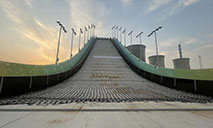Chinese cuisine taking in exotic tastes
BEIJING, Nov. 3 (Xinhua) -- A platter of Beijing fried sauce noodles, served with fried chicken nuggets and French fries in Beijing's downtown area, raise eyebrows.
"It is an unexpected mix and match with Chinese food in a Western fast-food restaurant," said a man surnamed Wang, who ordered the unique working lunch for roughly 35 yuan (5.47 U.S. dollars) at a KFC outlet.
An elder Beijinger surnamed Qiao now finds it easy to enjoy a family dinner with his wife and child who prefer Western food.
"Most western-style meals don't agree with me, but I enjoy delicious Beijing fried sauce noodles here," Qiao said.
The specialty has been freshly added to the fast-food chain's menus in Beijing. "It is a hot seller," said Shi Jiajia, a local KFC employee.
Customers can now order chicken rolls, preserved egg and pork congee, soybean milk, deep-fried dough sticks and boiled skewers, which are typical Chinese food, at KFC outlets in China.
The fusion of traditional Chinese and exotic tastes has been embraced by KFC as well as many other catering brands in China.
At the Beijing APM shopping mall, Tongrentang, a time-honored traditional Chinese medicine (TCM) pharmacy with a history of over 350 years, opened a coffee shop featuring herbal coffees in late September.
Coffee latte with goji berries or dried tangerine peels on top, or Americano with monk fruits -- such creative combinations have attracted numerous youngsters.
"Young consumers in China are increasingly health-conscious nowadays and would like to have a taste of our special coffee," said the coffee shop's manager. The coffee business has also boosted the sales of its medicinal materials and processed products.
Chinese per capita nominal consumer spending rose 15.8 percent year on year to 17,275 yuan in the first three quarters. After factoring in price levels, spending went up 15.1 percent year on year.
The country's ever-expanding consumption market will unleash huge market demand and investment opportunities, where Chinese and foreign brands can team up with each other, said Zhuang Rui, a professor at the University of International Business and Economics.
In July this year, China allowed cities including Shanghai, Beijing, Guangzhou, Tianjin and Chongqing to take the lead in building international consumption centers.
Beijing is expected to become an international tourism destination featuring shopping, food and cultures as well as digital consumption. Experts believe that the convergence of Chinese and Western cuisine is an inexorable trend for the city to build itself into an international consumption hub.
"There is no doubt that the Chinese market has huge potentials. Meanwhile, our household disposable income needs to be further raised and efforts should be made to cater to the demand for high-quality, diversified and personalized consumption," said Zhuang.
Photos
Related Stories
- Chinese cuisine gains popularity in Africa's online platform amid COVID-19 pandemic
- Potatoes take center stage on Chinese dining tables
- First Cantonese cuisine school established in U.S. Houston
- Made-in-China chili sauce exported to over 80 countries and regions
- China cultivates international talents in catering industry to promote Chinese cuisine
- People's Daily Comments: Silk Road recipes of Food Ranger from Canada
Copyright © 2021 People's Daily Online. All Rights Reserved.










